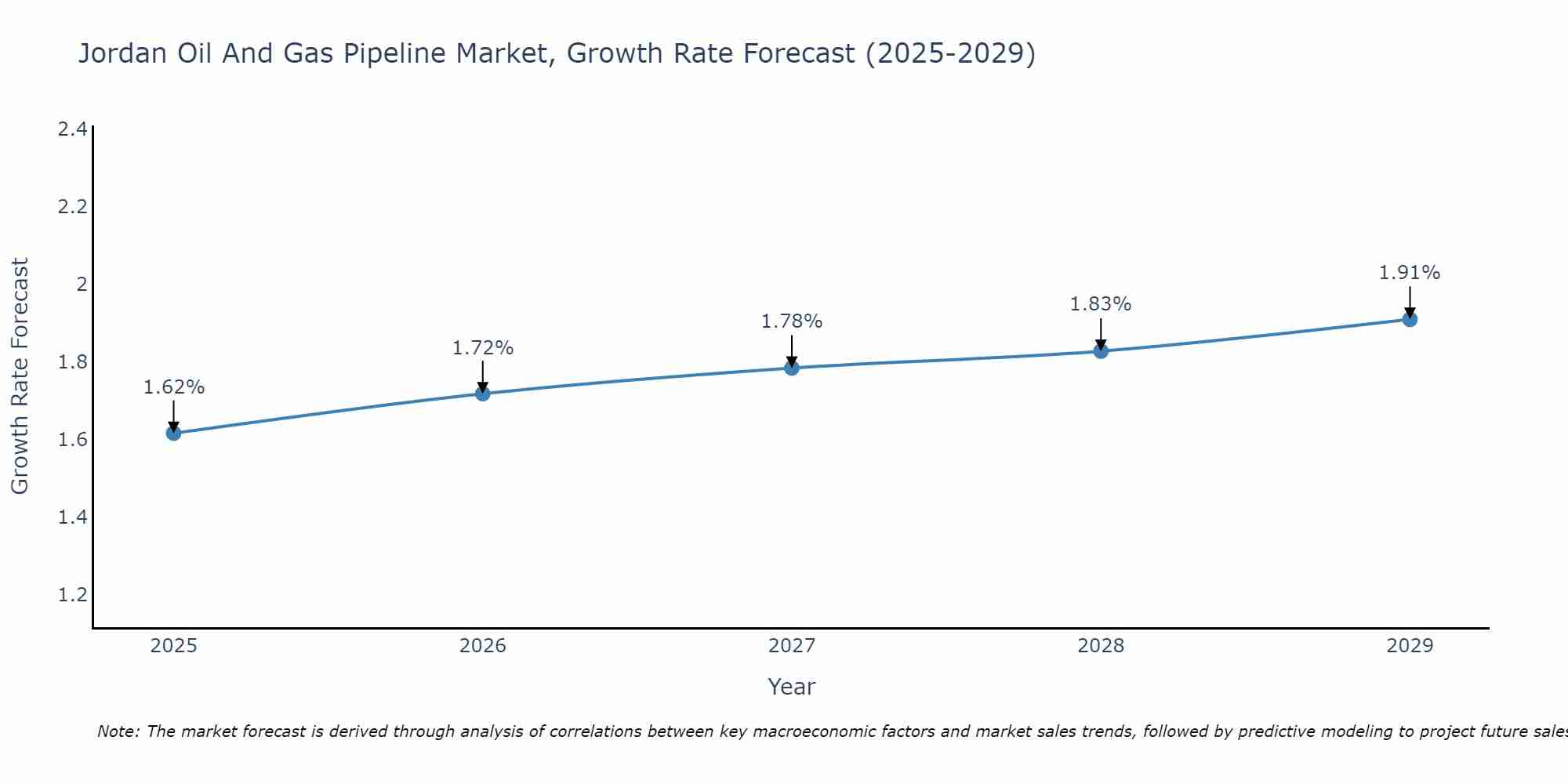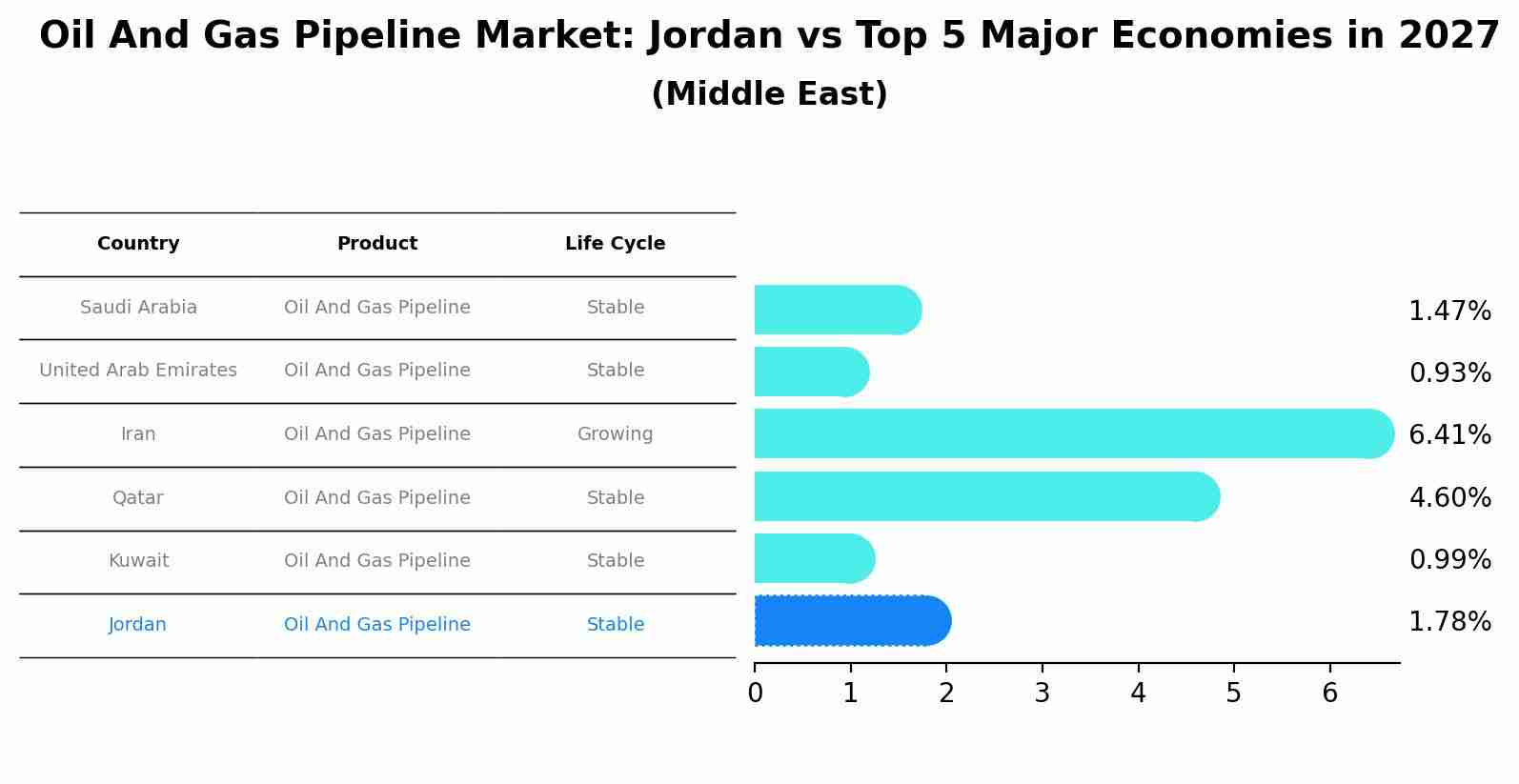Jordan Oil And Gas Pipeline Market Outlook | Growth, Industry, COVID-19 IMPACT, Share, Companies, Revenue, Forecast, Value, Analysis, Size & Trends
| Product Code: ETC377326 | Publication Date: Aug 2022 | Updated Date: Jul 2025 | Product Type: Market Research Report | |
| Publisher: 6Wresearch | Author: Summon Dutta | No. of Pages: 75 | No. of Figures: 35 | No. of Tables: 20 |
Jordan Oil And Gas Pipeline Market Size Growth Rate
The Jordan Oil And Gas Pipeline Market is likely to experience consistent growth rate gains over the period 2025 to 2029. From 1.62% in 2025, the growth rate steadily ascends to 1.91% in 2029.

Oil And Gas Pipeline Market: Jordan vs Top 5 Major Economies in 2027 (Middle East)
The Oil And Gas Pipeline market in Jordan is projected to grow at a stable growth rate of 1.78% by 2027, within the Middle East region led by Saudi Arabia, along with other countries like United Arab Emirates, Iran, Qatar and Kuwait, collectively shaping a dynamic and evolving market environment driven by innovation and increasing adoption of emerging technologies.

Jordan Oil And Gas Pipeline Market Synopsis
The Jordan oil and gas pipeline market is characterized by a growing demand for energy infrastructure to support the country`s economic development and energy security objectives. The market is primarily driven by the need to reduce reliance on imported energy sources and enhance domestic energy production capabilities. Key players in the market include the Jordan Petroleum Refinery Company, Arab Potash Company, and the Natural Resources Authority. The development of new pipeline projects, such as the proposed Iraq-Jordan oil pipeline and the Arab Gas Pipeline extension, is expected to further boost the market growth. However, challenges such as political instability in the region and environmental concerns pose potential risks to the market`s expansion. Overall, the Jordan oil and gas pipeline market presents opportunities for investment and strategic partnerships to meet the country`s energy needs.
Jordan Oil And Gas Pipeline Market Trends
The Jordan Oil and Gas Pipeline Market is experiencing several key trends. One significant trend is the increasing focus on diversifying energy sources and reducing reliance on traditional fossil fuels, driving investment in alternative energy infrastructure such as natural gas pipelines. Additionally, there is a growing emphasis on enhancing pipeline efficiency and safety through the adoption of advanced technology solutions like real-time monitoring systems and predictive maintenance tools. Another notable trend is the expansion of pipeline networks to connect Jordan to neighboring countries, facilitating cross-border energy trade and enhancing regional energy security. Moreover, the market is witnessing a push towards environmental sustainability, with efforts to minimize the environmental impact of pipeline operations through the implementation of eco-friendly practices and technologies.
Jordan Oil And Gas Pipeline Market Challenges
The Jordan Oil and Gas Pipeline market faces several challenges, including political instability in the region, which can impact investment decisions and project timelines. Additionally, regulatory hurdles and bureaucratic processes can slow down the development of pipeline infrastructure. Limited access to financing and technological constraints also pose challenges for companies operating in the market. Furthermore, competition from alternative energy sources and fluctuating oil and gas prices add to the complexity of the market environment. Overall, navigating these challenges requires a deep understanding of the local political and regulatory landscape, as well as strategic planning to mitigate risks and ensure the successful implementation of pipeline projects in Jordan.
Jordan Oil And Gas Pipeline Market Investment Opportunities
Investment opportunities in the Jordan oil and gas pipeline market include infrastructure development projects aimed at expanding and modernizing the existing pipeline network to meet the growing demand for energy transportation in the region. With Jordan`s strategic location as a gateway between oil-rich countries and major markets, there is potential for investors to participate in joint ventures or partnerships to fund the construction of new pipelines, storage facilities, and related infrastructure. Additionally, advancements in technology such as smart pipeline monitoring systems and automation solutions present opportunities for investment in enhancing the efficiency and safety of the pipeline operations. Overall, the Jordan oil and gas pipeline market offers prospects for investors looking to capitalize on the country`s energy sector growth and contribute to the development of critical infrastructure.
Jordan Agar Market Government Policies
The Jordanian government has implemented several policies to promote and regulate the oil and gas pipeline market in the country. These policies include the establishment of the Energy Regulatory Commission (ERC) to oversee the sector and ensure fair competition. Additionally, the government has incentivized investment in pipeline infrastructure through tax breaks and subsidies to enhance the efficiency and reliability of the country`s energy supply. Furthermore, there are regulations in place to ensure environmental protection and safety standards are maintained in the operation of oil and gas pipelines. Overall, these policies aim to attract investment, promote sustainable development, and secure energy resources for Jordan`s growing economy.
Jordan Oil And Gas Pipeline Market Future Outlook
The future outlook for the Jordan Oil and Gas Pipeline Market appears positive, with anticipated growth driven by increasing demand for energy resources in the region. Jordan`s strategic location as a gateway between oil-rich Middle Eastern countries and global markets positions it as a key player in the transportation of oil and gas. The government`s focus on infrastructure development and attracting foreign investments to enhance energy security further fuels the market`s growth potential. Additionally, ongoing projects such as the construction of new pipelines and expansion of existing infrastructure will likely support the market`s expansion in the coming years. Despite challenges such as geopolitical tensions and regulatory hurdles, the Jordan Oil and Gas Pipeline Market is poised for steady growth, offering opportunities for industry players and investors alike.
Key Highlights of the Report:
- Jordan Oil And Gas Pipeline Market Outlook
- Market Size of Jordan Oil And Gas Pipeline Market, 2021
- Forecast of Jordan Oil And Gas Pipeline Market, 2031
- Historical Data and Forecast of Jordan Oil And Gas Pipeline Revenues & Volume for the Period 2018 - 2031
- Jordan Oil And Gas Pipeline Market Trend Evolution
- Jordan Oil And Gas Pipeline Market Drivers and Challenges
- Jordan Oil And Gas Pipeline Price Trends
- Jordan Oil And Gas Pipeline Porter's Five Forces
- Jordan Oil And Gas Pipeline Industry Life Cycle
- Historical Data and Forecast of Jordan Oil And Gas Pipeline Market Revenues & Volume By Location of Deployment for the Period 2018 - 2031
- Historical Data and Forecast of Jordan Oil And Gas Pipeline Market Revenues & Volume By Onshore for the Period 2018 - 2031
- Historical Data and Forecast of Jordan Oil And Gas Pipeline Market Revenues & Volume By Offshore for the Period 2018 - 2031
- Historical Data and Forecast of Jordan Oil And Gas Pipeline Market Revenues & Volume By Type for the Period 2018 - 2031
- Historical Data and Forecast of Jordan Oil And Gas Pipeline Market Revenues & Volume By Crude Oil Pipeline for the Period 2018 - 2031
- Historical Data and Forecast of Jordan Oil And Gas Pipeline Market Revenues & Volume By Gas Pipeline for the Period 2018 - 2031
- Jordan Oil And Gas Pipeline Import Export Trade Statistics
- Market Opportunity Assessment By Location of Deployment
- Market Opportunity Assessment By Type
- Jordan Oil And Gas Pipeline Top Companies Market Share
- Jordan Oil And Gas Pipeline Competitive Benchmarking By Technical and Operational Parameters
- Jordan Oil And Gas Pipeline Company Profiles
- Jordan Oil And Gas Pipeline Key Strategic Recommendations
Frequently Asked Questions About the Market Study (FAQs):
- Single User License$ 1,995
- Department License$ 2,400
- Site License$ 3,120
- Global License$ 3,795
Search
Thought Leadership and Analyst Meet
Our Clients
Related Reports
- Canada Oil and Gas Market (2026-2032) | Share, Segmentation, Value, Industry, Trends, Forecast, Analysis, Size & Revenue, Growth, Competitive Landscape, Outlook, Companies
- Germany Breakfast Food Market (2026-2032) | Industry, Share, Growth, Size, Companies, Value, Analysis, Revenue, Trends, Forecast & Outlook
- Australia Briquette Market (2025-2031) | Growth, Size, Revenue, Forecast, Analysis, Trends, Value, Share, Industry & Companies
- Vietnam System Integrator Market (2025-2031) | Size, Companies, Analysis, Industry, Value, Forecast, Growth, Trends, Revenue & Share
- ASEAN and Thailand Brain Health Supplements Market (2025-2031) | Strategy, Consumer Insights, Analysis, Investment Trends, Opportunities, Growth, Size, Share, Industry, Revenue, Segments, Value, Segmentation, Supply, Forecast, Restraints, Outlook, Competition, Drivers, Trends, Demand, Pricing Analysis, Competitive, Strategic Insights, Companies, Challenges
- ASEAN Bearings Market (2025-2031) | Strategy, Consumer Insights, Analysis, Investment Trends, Opportunities, Growth, Size, Share, Industry, Revenue, Segments, Value, Segmentation, Supply, Forecast, Restraints, Outlook, Competition, Drivers, Trends, Demand, Pricing Analysis, Competitive, Strategic Insights, Companies, Challenges
- Europe Flooring Market (2025-2031) | Outlook, Share, Industry, Trends, Forecast, Companies, Revenue, Size, Analysis, Growth & Value
- Saudi Arabia Manlift Market (2025-2031) | Outlook, Size, Growth, Trends, Companies, Industry, Revenue, Value, Share, Forecast & Analysis
- Uganda Excavator, Crane, and Wheel Loaders Market (2025-2031) | Strategy, Consumer Insights, Analysis, Investment Trends, Opportunities, Growth, Size, Share, Industry, Revenue, Segments, Value, Segmentation, Supply, Forecast, Restraints, Outlook, Competition, Drivers, Trends, Demand, Pricing Analysis, Competitive, Strategic Insights, Companies, Challenges
- Rwanda Excavator, Crane, and Wheel Loaders Market (2025-2031) | Strategy, Consumer Insights, Analysis, Investment Trends, Opportunities, Growth, Size, Share, Industry, Revenue, Segments, Value, Segmentation, Supply, Forecast, Restraints, Outlook, Competition, Drivers, Trends, Demand, Pricing Analysis, Competitive, Strategic Insights, Companies, Challenges
Industry Events and Analyst Meet
Whitepaper
- Middle East & Africa Commercial Security Market Click here to view more.
- Middle East & Africa Fire Safety Systems & Equipment Market Click here to view more.
- GCC Drone Market Click here to view more.
- Middle East Lighting Fixture Market Click here to view more.
- GCC Physical & Perimeter Security Market Click here to view more.
6WResearch In News
- Doha a strategic location for EV manufacturing hub: IPA Qatar
- Demand for luxury TVs surging in the GCC, says Samsung
- Empowering Growth: The Thriving Journey of Bangladesh’s Cable Industry
- Demand for luxury TVs surging in the GCC, says Samsung
- Video call with a traditional healer? Once unthinkable, it’s now common in South Africa
- Intelligent Buildings To Smooth GCC’s Path To Net Zero


















